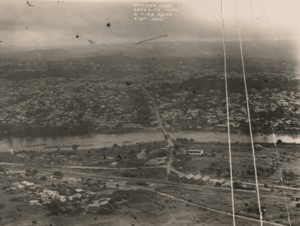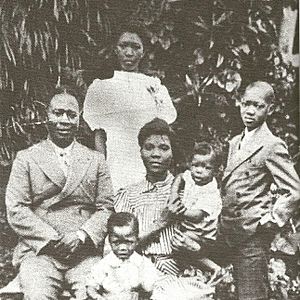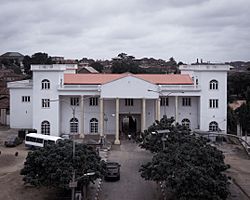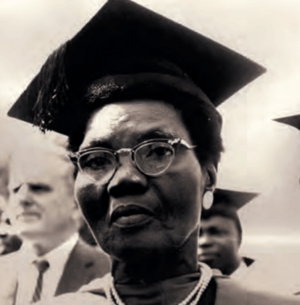Funmilayo Ransome-Kuti facts for kids
Quick facts for kids
Funmilayo Ransome-Kuti
MON
|
|
|---|---|
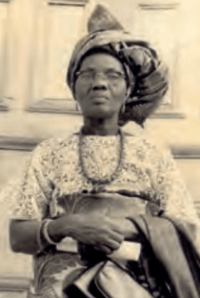
Ransome-Kuti on her 70th birthday
|
|
| Personal details | |
| Born |
Frances Abigail Olufunmilayo Thomas
25 October 1900 Abeokuta, Southern Nigeria (now Abeokuta, Ogun State) |
| Died | 13 April 1978 (aged 77) Lagos, Nigeria |
| Spouse |
Israel Oludotun Ransome-Kuti
(m. 1925; died 1955) |
| Children |
|
| Relatives |
|
| Occupation | Educator, politician, women's rights activist |
| Awards | Lenin Peace Prize (1970) |
Funmilayo Ransome-Kuti (born Frances Abigail Olufunmilayo Thomas; 25 October 1900 – 13 April 1978) was an important Nigerian teacher, politician, and activist. She fought for women's rights and for Nigeria's independence. She is also known as Funmilayo Anikulapo-Kuti.
Born in Abeokuta, Nigeria, she was the first girl to attend the Abeokuta Grammar School. As a young woman, she taught classes and helped set up some of the first preschools in Nigeria. She also organized reading classes for women who didn't have much money.
In the 1940s, Ransome-Kuti started the Abeokuta Women's Union. She worked hard to get women more involved in local government. She also fought against unfair taxes on women who sold goods in the market. People called her the "Lioness of Lisabi" because she was so brave. She led huge protests with up to 10,000 women. These protests even made the local ruler, the Alake, step down for a short time in 1949.
As her influence grew, she joined the movement for Nigeria to become independent. She went to meetings and traveled overseas to talk about new laws for the country. She helped create the Nigerian Women’s Union and the Federation of Nigerian Women’s Societies. She pushed for Nigerian women to have the right to vote. She also became well-known in international groups that worked for peace and women's rights.
Funmilayo Ransome-Kuti received the Lenin Peace Prize and was given an award called the Order of the Niger for her work. Later in her life, she supported her sons who spoke out against Nigeria's military governments. She died at age 77 after being hurt during a military attack on her family's home. Her children included the famous musician Fela Kuti, the doctor and activist Beko Ransome-Kuti, and the health minister Olikoye Ransome-Kuti.
Contents
Early Life and Education
Frances Abigail Olufunmilayo Olufela Folorunso Thomas was born on 25 October 1900. Her hometown was Abeokuta, in Ogun State, Nigeria. Her father, Daniel Olumeyuwa Thomas, was a farmer and trader. Her mother, Lucretia Phyllis Omoyeni Adeosolu, was a dressmaker.
Even though it was not common then, Funmilayo's parents believed that both boys and girls should get a good education. She went to Abeokuta Grammar School for her high school education. This school had only been for boys before. But in 1914, it let in its first six female students, and Frances was one of them.
From 1919 to 1922, she went to a special school for girls in Cheshire, England. There, she learned things like music, sewing, and French. While in England, she decided to use her Yoruba name, Funmilayo, instead of her Christian name, Frances. This was likely because she experienced racism there. After her studies, she returned to Abeokuta and became a teacher.
On 20 January 1925, Funmilayo married Reverend Israel Oludotun Ransome-Kuti. He was also a strong believer in education and bringing people together. He helped start the Nigeria Union of Teachers. Their marriage lasted 30 years and was based on equality and respect.
After getting married, Funmilayo stopped her old teaching job. But she quickly found new ways to help. In 1928, she started one of the first preschool classes in Nigeria. She also created a club for young women from wealthy families to help them improve themselves. At the same time, she organized classes for women who couldn't read or write. In the mid-1930s, she became the first woman in Abeokuta to drive a car.
Funmilayo and her husband had four children. Their daughter was named Dolupo (born 1926). Their sons were Olikoye (born 1927), Olufela (born 1938), and Bekolari (born 1940).
Activism and Women's Rights
Starting the Abeokuta Women's Union
In 1932, Funmilayo Ransome-Kuti helped create the Abeokuta Ladies Club. This club did charity work and offered adult education. At first, most members were educated Christian women. But by the 1940s, the club became more focused on politics.
Funmilayo started teaching reading to market women. Through this, she learned about the unfairness many Nigerian women faced. She realized that the true situation of Nigerian women should be judged by those who worked hard, not by those who had an easy life. In 1944, she successfully stopped local officials from taking rice from market women unfairly.
In 1946, the club officially became the Abeokuta Women's Union (AWU). It was now open to all women in Abeokuta. The AWU focused on fighting unfair prices and taxes on market women. Funmilayo Ransome-Kuti became its president. She founded the union with Grace Eniola Soyinka. The AWU grew to have 20,000 official members and many more supporters. To unite women, Funmilayo and other educated members spoke the Yoruba language and wore traditional Yoruba clothes at meetings.
Fighting Unfair Taxes
Funmilayo Ransome-Kuti's first big political action was leading the AWU against a tax on women. In Abeokuta, market women had to pay a special tax to market supervisors. The local ruler, the Alake Ademola II, had put these taxes on women. After trying to get the British authorities to remove the Alake and stop the tax, Funmilayo and the AWU started contacting newspapers and collecting signatures.
To put more pressure on the authorities, AWU members refused to pay their taxes. They held long protests outside the Alake's palace. They also demanded that women should have a say in the local government.
By late 1947, officials tried to stop the women's protests. But Funmilayo and her group said they were just planning "picnics" and "festivals." Up to 10,000 women joined these demonstrations. Sometimes, police used tear gas, but Funmilayo taught the women how to handle it. The AWU also used its money to pay for lawyers for arrested members. One story says that when a British officer told Funmilayo to make her women quiet, she bravely replied, "You may have been born, but you were not bred! Would you speak to your mother like that?" The West African Pilot newspaper called her the "Lioness of Lisabi."
In February 1948, the Alake called the AWU women "vipers" and banned Funmilayo from the palace. Right after this, AWU members blocked the palace entrance. They would not let a British officer leave. Funmilayo even grabbed the steering wheel of his car and wouldn't let go. More and more people supported the women. After many protests, the Alake finally stopped the tax on women in April 1948. In early 1949, the AWU's efforts led to the Alake temporarily stepping down from his position. News about this spread across Nigeria, making Funmilayo Ransome-Kuti famous.
Working for National Change
In 1947, Funmilayo Ransome-Kuti was the only woman in a group that went to London, England. They were protesting a new Nigerian constitution. In London, she gave speeches about Nigerian women's issues. She also wrote an article saying that British rule had made Nigerian women less powerful. In 1949, when a meeting was held in Nigeria to discuss a new constitution, Funmilayo was again the only woman. She strongly argued for women to have the right to vote.
In May 1949, Funmilayo suggested creating the Nigerian Women's Union (NWU). This union would support women's rights across the whole country. The AWU supported her idea and became a part of the NWU. For several years, Funmilayo traveled all over Nigeria to help set up NWU branches. She was the president of both the NWU and her local union in Abeokuta. The NWU worked to get women the right to vote and to have more women in politics.
Funmilayo Ransome-Kuti was a founding member of the NCNC political party. In 1951, she ran for a regional assembly seat but did not win. This was partly because a special tax for voters meant many of her supporters, especially women, could not vote.
In 1953, Funmilayo organized a meeting in Abeokuta to talk about women's voting rights. Four hundred women attended this two-day event. They then formed the Federation of Nigerian Women's Societies (FNWS). The FNWS pushed for women to be included in politics, for better education, and for new social services and healthcare.
In the early 1950s, Funmilayo Ransome-Kuti was given the chieftaincy title of Oloye of the Yoruba people. She was the first woman to be appointed to the Western House of Chiefs. She also served on the board of the Nigerian Union of Teachers.
Travel and Independence
On 6 April 1955, Funmilayo's husband, Israel Ransome-Kuti, passed away after a long illness. Funmilayo was very sad, but she continued her political work. Over the next 20 years, she also focused on starting new schools in Abeokuta. She deeply believed in the importance of education for everyone.
Funmilayo Ransome-Kuti kept traveling widely. She made strong connections with women's groups in Algeria, Egypt, and Ghana. She also visited England, China, the Soviet Union, Switzerland, and other countries.
In 1956, she visited China and met Mao Zedong. Funmilayo believed in some socialist ideas. She called herself an "African Socialist." Because she visited China with help from a group called the Women's International Democratic Federation (WIDF), British officials became suspicious. They worried she might spread communist ideas. The next year, her passport was not renewed. In 1958, she was invited to a women's rights meeting in the United States, but she was denied a visa. Officials thought she had "too many Communist connections." Funmilayo protested and said she was not a communist, but her protests were ignored. She finally got her passport back when Nigeria became independent in 1960.
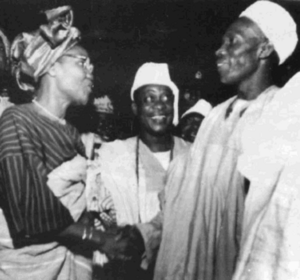
In 1959, Funmilayo ran for office as an independent candidate, but she lost. After this, her political party, the NCNC, took away her membership. She then started her own party, the Commoners' People's Party, but it did not last long.
After Nigeria became independent in 1960, a new constitution gave all adult men and women the right to vote. However, women in the Northern Region of Nigeria did not get voting rights right away.
Nigeria's early years of independence had many political disagreements. When a military coup happened in 1966, Funmilayo felt it was a good step for the country. But she spoke out against the violence that followed. She was also the president of the Nigerian branch of the Women's International League for Peace and Freedom (WILPF) since 1963.
In 1965, Funmilayo Ransome-Kuti received a national honor called membership in the Order of the Niger. The University of Ibadan gave her an honorary doctorate in 1968. She also received the Lenin Peace Prize in 1970.
In 1969, Funmilayo was made chairman of the Advisory Board of Education by the western Nigeria state government. She also advised the Federal Ministry of Education on hiring teachers from other countries.
In the early 1970s, Funmilayo changed her last name to "Anikulapo-Kuti." Her son Fela had changed his name to show he was moving away from European influences. "Anikulapo" is a Yoruba word that means "hunter who carries death in a pouch" or "warrior who carries strong protection."
Death
In her later years, Funmilayo Anikulapo-Kuti's son Fela, a musician and activist, often criticized Nigeria's military governments. Fela had been arrested and jailed several times. His home was also raided. To show he did not respect the government, he called his home "the Kalakuta Republic." It became a place where friends and supporters could gather safely. In 1976, Fela released an album called Zombie, which compared the army to robots. Many believe this song made the conflict between Fela and the government worse.
Funmilayo Anikulapo-Kuti often visited her son at his home. She was there on 18 February 1977, when about 1,000 armed soldiers attacked the property. The soldiers destroyed things and hurt the people inside. Fela and his brother Bekolari were badly beaten. Funmilayo Anikulapo-Kuti was thrown from a second-floor window. After the attack, she was taken to the hospital and later fell into a coma. She died on 13 April 1978, because of her injuries.
Funmilayo Anikulapo-Kuti was buried in Abeokuta, in the same place as her husband. Thousands of people attended her funeral. Many market women and traders closed their shops across the city to honor her. Major Nigerian news outlets praised her, calling her a "progressive revolutionary" and a "Pan-African visionary."
One year after her death, Fela took a coffin and traveled almost 20 kilometers to the Dodan Barracks in Lagos. He left the coffin at the gate to shame the government. This event is described in his song "Coffin for Head of State."
Legacy
Funmilayo Ransome-Kuti is still very well known in Nigeria. No other Nigerian woman of her time was as famous nationally or had so many international connections. Other Nigerian activists, like Hajiya Gambo and Margaret Ekpo, said Funmilayo Ransome-Kuti greatly influenced their work. Ghanaian politician Kwame Nkrumah was also inspired by her in his early work with women's groups.
In 2012, the Nigerian government suggested putting Funmilayo Ransome-Kuti's picture on the new N5000 currency note. However, her grandson, musician Seun Kuti, said this was "ridiculous." He pointed out that the government had never apologized for the attack on their family home, which led to his grandmother's death.
Funmilayo Ransome-Kuti was played by actress Deola Sagoe in the 2014 film October 1. On 25 October 2019, she was honored with a Google Doodle created by Nigerian-Italian artist Diana Ejaita.
Images for kids
See also
 In Spanish: Funmilayo Ransome-Kuti para niños
In Spanish: Funmilayo Ransome-Kuti para niños


